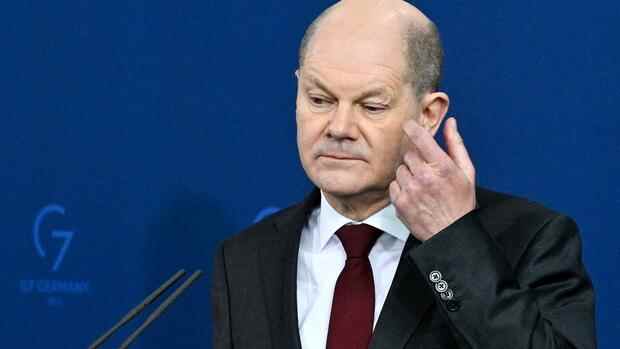The Chancellor describes Russia’s attack on Ukraine as a “blatant breach of international law”.
(Photo: dpa)
Berlin The German government is horrified by Russia’s military action against Ukraine. Federal Chancellor Olaf Scholz made his press statement in a dark suit and black tie.
Emotionless but determined, Scholz spoke in Berlin of a “dark day for Europe”. Russia’s President Vladimir Putin “blatantly breaks international law” and questions the peace order in Europe. “This is Putin’s war,” he said.
He announced further tough sanctions. “It’s good that we prepared this carefully.” The aim of these sanctions is to make it clear to the Russian leadership that they will pay a bitter price for this aggression.
Addressing Russian President Vladimir Putin, he said: “It will become clear: Putin made a serious mistake with his war.” Referring to the Eastern European NATO states, he said: “We fully understand your concerns in view of this development Good. We will stand by your side.” Germany stands by NATO’s duty of assistance.
Top jobs of the day
Find the best jobs now and
be notified by email.
Agreement planned within the framework of the G7
The Chancellor counted a whole series of meetings at which he wants to coordinate further countermeasures within the framework of the G7, NATO and the EU. The EU heads of state and government want to discuss the escalation in the Ukraine conflict at a crisis summit on Thursday evening. In the afternoon, the heads of state and government of the group of seven leading democratic economic powers (G7) will meet at Scholz’s invitation.
Germany chairs the “Group of Seven”, which also includes the USA, France, Great Britain, Italy, Japan and Canada. It is expected that a drastic tightening of the sanctions will be decided at these meetings. Among other things, the meeting will deal with how Russia can be held accountable for its actions and how Ukraine can be supported. The EU had already decided on a package of sanctions against Moscow on Wednesday.
But Scholz is also reacting to the unusual situation domestically. On Sunday he wants to make a government statement “on the current situation” in a special session of the Bundestag. In doing so, he informs the MPs and in particular the opposition. The Bundestag would also have to be involved in more far-reaching decisions. The Bundeswehr is a parliamentary army.
The Ukrainian government and military reported several attacks on Thursday, mainly in the north and north-east of the country. Explosions were heard in Kharkiv and the port city of Mariupol on the Sea of Azov. According to the border troops, Russian armored units in the east and north-east penetrated into Ukrainian territory. There are also attacks from the annexed peninsula of Crimea.
Ukrainian Foreign Minister Dmitro Kuleba spoke of a “large-scale war against Ukraine”. President Volodymyr Zelensky declared martial law. According to Handelsblatt reporter Jürgen Klöckner, there was a bomb alarm in the capital Kiev.
“The bomb alarm woke me up last night,” reports Klöckner on Twitter. He and his colleagues were brought to safety: “We were evacuated to an underground car park – with many other colleagues – to protect us from the bombs.”
More on the Ukraine crisis:
Vice-Chancellor and Federal Minister for Economics and Climate Protection, Robert Habeck, also strongly condemned Russia’s actions as a “shameless breach of international law”. “Now the unbelievable has happened,” said the Green politician on Thursday. “Russia is attacking Ukraine. We have a land war in Europe that we thought was only in history books.”
On Wednesday evening, Habeck emphasized in a TV show that the Ukraine crisis would lead to a turning point in Germany’s energy policy.
(Photo: Reuters)
On Wednesday evening, Habeck emphasized in a TV show that the Ukraine crisis would lead to a turning point in Germany’s energy policy. “I expect a federal consensus that we’re going to get serious now and not talk about procedures to expand power grids, power plants or renewable energies,” said Habeck.
The federal government is prepared to accept high costs for this. “Then we’ll take money. In the end it’s just money. This is about national security. If the situation requires it, the necessary funds will be made available,” said Habeck on ARD.
Federal Foreign Minister Annalena Baerbock also argued in this direction: “This war in our neighborhood will also have consequences for us in Germany,” she said, referring to rising energy prices and falling share prices. But one must now resolutely stand up for the European peace order, which has been the basis for prosperity and peace for decades. If you don’t do this, you have to pay an even higher price.
More: Electricity, gas, oil – industry fears the next price shock because of the Ukraine crisis
